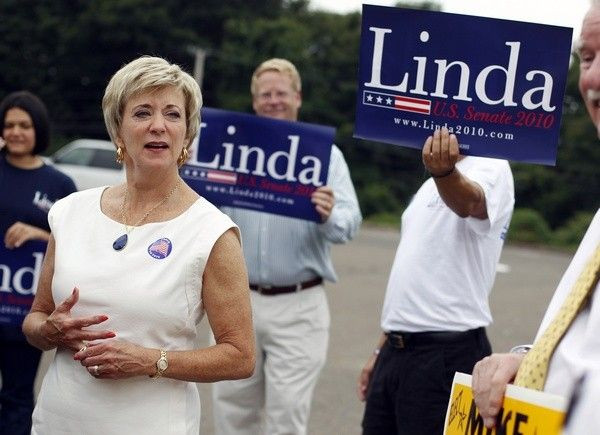Linda McMahon Reflects On Failed $97 Million Senatorial Bids

Linda McMahon, the former CEO of World Wrestling Entertainment (WWE) who lost her second consecutive senatorial bid on Nov. 6, opened up about the loss and the staggering personal fortune she committed to both of the races in an interview with BusinessWeek on Thursday.
The businesswoman-turned-politician provoked the anger of many of her fellow Republicans when she aligned herself with President Obama, running a series of TV ads showcasing Obama voters who said they would vote for her too, and printing T-shirts that said “I support Obama and McMahon.” She also caught flack from political pundits who accused her of using her personal wealth to try to buy the election.
McMahon’s attempt to distance herself from the Republican party to curry favor with Connecticut voters ultimately proved unsuccessful: on Tuesday the 64-year-old lost the senatorial race to Democratic Rep. Chris Murphy, in what was widely touted as the single most expensive election in Connecticut’s history.
Despite running on a Republican ticket in an overwhelmingly Democratic state – according to Bloomberg News, less than 20 per cent of Connecticut voters are registered as Republicans – McMahon spent a total of $97 million funding the two campaigns.
Here are excerpts her interview on Thursday:
Q: When did you realize you’d lost the race?
A: I was sitting by myself, actually. I had just taken a moment to go upstairs and get my thoughts together on what I was still hoping would be a victory speech. I was just sitting there, going over my speech—clearly you have a concession speech as well, but you’re hoping that’s not the one you use. I wasn’t paying that much attention to the TV. This was about 40 minutes after the polls closed. Then I looked up and saw a check mark next to Chris Murphy’s name on ABC. I barely caught it out of the corner of my eye. I just thought, “Wow.” I was stunned for a moment. I sat there for a few minutes on my own, reflecting on what the race had been. I thought about the thousands of people who not only had touched me but whom I had touched as well. All the notes, “Thank you for running. Thank you for showing me that it’s worth putting everything on the line,” and things like that.
Q: You must have gone into this knowing it would be tough to win.
A: It always is a battle for a Republican in Connecticut, even one who’s a moderate like I am, and one who’s an independent thinker. We had a president who had strong coattails. I had a message that did resonate with a good number of people in the state, but the other guy got more votes.
Q: Did the scrutiny you got at WWE make it easier to handle it on the campaign trail?
A: Being under the political spotlight is far different than anything I’d experienced before. Every word is a critical word. Sometimes you really aren’t allowed to get your full thought out. A lot of it is about having a 30-second sound bite.
Q: A lot has been made of $97 million you’ve spent in these races. How do you think that’s been portrayed?
A: The way it’s framed is that I’m trying to buy the election for my own personal gain. What would be my personal gain? I’m not looking for a new career. I’ve had a wonderful career. I was hoping to bring a different voice and perspective and use my skills that have been honed as a CEO in bringing people together. I’ve had a little bit of fame and fortune. I’ve been in the public eye. I wasn’t looking for a hobby. If I were looking for a hobby, it wouldn’t be the United States Senate. That’s one of the toughest jobs I’d probably ever do. I just felt there wasn’t enough compromise going on: People were too far to the left, too far to the right, with no one trying to build a compromise. I understand the attention. Look, it’s an incredible amount of money to spend on a campaign.
Q: Was it money well spent?
A: I feel really good about what I’ve accomplished. So many people have said, “You’ve made me think that I can do something. You’ve made me look at things a new way.” I think people were more thoroughly convinced the second time around that I was passionate about these issues. I found that I had a special following among 12- to 14-year-old girls. I was incredibly flattered. When I asked a mother about it, she said, “You have become a role model for these girls.”
Q: What’s next for you?
A: One thing I’ll continue to do is our philanthropic work. I’m not really focused right now on what happens next. I don’t really anticipate running for public office again. I think I’ve given that a really good, strong shot. At this moment, it’s not a consideration. Things can always change but it’s not something I anticipate right now.
© Copyright IBTimes 2025. All rights reserved.





















